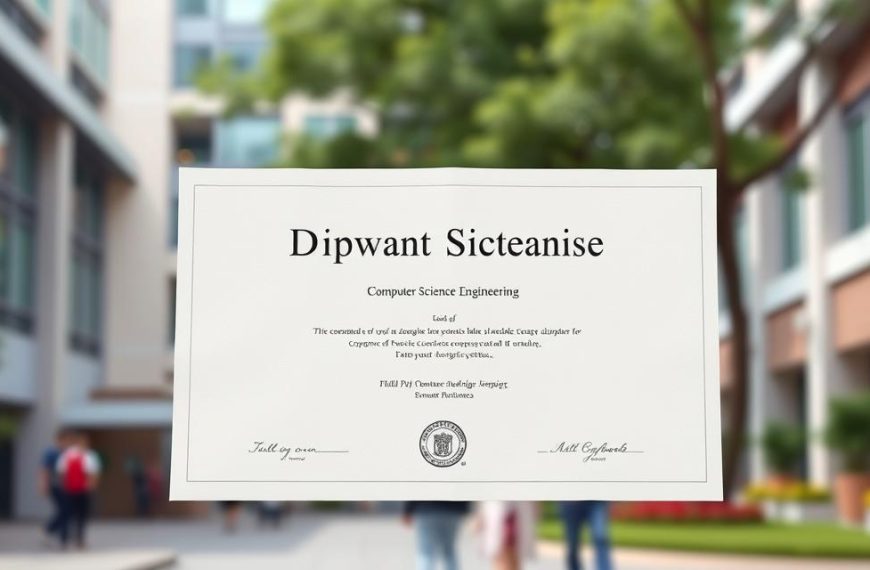The tech industry is booming, with a 26% growth projected for computer research scientists by 2031. This surge highlights the increasing demand for advanced skills in the field. A master degree in computer science can open doors to higher-paying roles and leadership positions.
According to BLS data, IT occupations offer a median salary of $104,420, significantly higher than the national median of $48,000. Additionally, 72% of tech professionals report job satisfaction, compared to just 52% in other industries. This makes a master degree a smart investment for career advancement.
Case Western Reserve University offers a flexible online program tailored for working professionals. With 33% of employers now requiring a master degree for roles previously filled by bachelor’s holders, this program positions graduates for success in a competitive industry.
Introduction: Why Get a Master’s in Computer Science?
The demand for advanced technical skills continues to rise in today’s job market. With 52% of U.S. workers considering career changes due to advancement concerns, a master degree in computer science offers a clear path forward. This degree addresses three core motivations: financial growth, academic enrichment, and social connections.
In the tech industry, job satisfaction stands at 72%, significantly higher than the 56% reported in other fields. This disparity highlights the unique opportunities available in software development and related areas. Employers increasingly prefer candidates with graduate degrees, with 38% of computer science job listings now requiring a master degree.
Accelerated programs, like the 18-month options at the University of Colorado Boulder, make it easier for professionals to balance education with work. Networking also plays a crucial role, with 85% of positions filled through connections. Universities often provide access to alumni associations and industry events, fostering valuable relationships.
Common challenges, such as skills gaps and salary ceilings, can be addressed through advanced education. A master degree not only bridges the academic-industry skills mismatch but also opens doors to emerging fields like AI, cybersecurity, and data science. For those feeling career stagnation, this degree offers a powerful solution.
Benefits of Earning a Master’s in Computer Science
Graduate-level education in computer science offers significant professional benefits. From higher salaries to specialized knowledge, this degree equips individuals with the tools to excel in a competitive industry. Let’s explore the key advantages.
Higher Salaries and Earning Potential
One of the most compelling reasons to pursue a master degree is the potential for increased pay. According to PayScale, the median salary for individuals with this degree is $115,000, compared to $86,000 for those with a bachelor’s. This $29,000 difference highlights the financial rewards of advanced education.
Glassdoor data further supports this, showing that roles like cloud architects earn $146,000 annually, while security analysts make $112,000. These figures demonstrate the salary premiums associated with specialized expertise.
Advanced Subject Knowledge and Specialization
A master degree provides in-depth knowledge in cutting-edge areas like AI, quantum computing, and blockchain development. These fields are shaping the future of technology, and advanced credentials position graduates to lead in these domains.
Specialization also opens doors to niche industries such as aerospace and defense, where advanced degrees are often required. This level of expertise ensures professionals remain relevant in a rapidly evolving field.
Increased Employability and Competitive Edge
Employers increasingly value graduate degrees, with 92% recognizing the soft skill development they foster. This includes critical thinking, problem-solving, and leadership abilities, which are essential for senior-level positions.
Additionally, 20% of software developers hold a master degree, compared to 72% with a bachelor’s. This statistic underscores the competitive edge that advanced education provides in securing high-demand jobs.
“A master degree not only enhances technical skills but also prepares individuals for leadership roles in the tech industry.”
With a clear ROI timeline and opportunities for career growth, pursuing a master degree in computer science is a strategic investment in your future.
Career Opportunities with a Master’s in Computer Science
Earning a graduate degree unlocks a wide range of career opportunities in the tech sector. From leadership roles to cutting-edge research, advanced education prepares individuals for high-demand positions in a competitive industry.
Senior-Level and Managerial Positions
Graduates often transition into senior-level roles, such as Machine Learning Engineers or Cloud Architects. These positions offer median salaries of $121,000 and $146,000, respectively. Leadership pipelines in Fortune 500 companies frequently require advanced credentials, making this degree a key differentiator for promotions.
Additionally, 40% of tech managers cite a graduate degree as essential for career advancement. This credential not only enhances technical expertise but also fosters critical soft skills like leadership and problem-solving.
Research and Academic Roles
For those interested in academia or research, a graduate degree serves as a stepping stone to PhD programs. Universities like Case Western Reserve offer robust research opportunities, preparing students for roles in data analysis and scientific discovery.
Industry research positions, such as those at NASA Glenn Research Center, also require advanced education. These roles often demand published research or patent experience, which a graduate program can help achieve.
Emerging Fields and Specializations
The tech industry is evolving rapidly, with growing demand in areas like cybersecurity and AI ethics. Specializations such as IoT architecture and quantum machine learning are shaping the future of technology.
Stackable credentials, combining a graduate degree with certifications like AWS or Azure, further enhance employability. This approach ensures professionals remain competitive in a dynamic industry.
- Cybersecurity roles are projected to grow by 33% by 2031.
- Alumni from top programs often secure positions at Microsoft, IBM, and other leading firms.
- Emerging fields like quantum computing offer lucrative and innovative career paths.
With diverse opportunities across industries, a graduate degree in computer science is a strategic investment for long-term career growth.
Financial Considerations: Is It Worth the Investment?
Investing in advanced education requires careful financial planning. A graduate degree can significantly impact your career trajectory, but it’s essential to weigh the costs and benefits. This section explores tuition expenses, opportunity costs, and the long-term return on investment (ROI).
Tuition Costs and Financial Aid
Tuition for a master program can range from $30,000 to $120,000, depending on the institution. Online platforms like Coursera offer affordable options at $20,000, while Ivy League schools may charge up to $120,000. Financial aid, including scholarships and employer reimbursement, can ease the burden.
Case Western Reserve University’s 30-credit program costs $45,000, making it a mid-range option. Geographic location also affects affordability, with Bay Area salaries offsetting higher living costs compared to the Midwest.
Opportunity Cost and Lifetime Earnings
Pursuing a master degree often means pausing full-time work, resulting in lost income. However, the long-term pay-off can outweigh this initial sacrifice. Graduates typically earn $29,000 more annually than those with a bachelor’s degree.
Over a 20-year career, this translates to significant financial gains. For example, a 5% annual raise with a graduate degree outperforms a 10% increase from job-hopping without one.
Return on Investment (ROI)
Calculating ROI involves comparing tuition costs to potential earnings. A 12-year break-even point is common, after which the increased salary outweighs the initial investment. Stock compensation at FAANG companies and startup equity can further enhance ROI.
Public service loan forgiveness is another option for those in academic or research roles. Forbes ranks computer science as the #2 field for salary increases, making it a smart financial decision.
| Program Type | Tuition Range | ROI Break-Even |
|---|---|---|
| Online (Coursera) | $20,000 | 10 years |
| Mid-Range (Case Western) | $45,000 | 12 years |
| Ivy League | $120,000 | 15 years |
Academic and Professional Growth
Pursuing advanced education in computer science fosters both academic and professional growth. This journey enhances technical expertise while building essential soft skills. It also opens doors to networking and research opportunities, creating a well-rounded foundation for career success.
Deepening Core Computer Science Knowledge
Graduate programs focus on advanced topics like algorithms and distributed systems. These courses bridge the gap between theoretical concepts and practical applications. Students gain hands-on experience with tools like Kubernetes and Python scripting, preparing them for real-world challenges.
Case Western Reserve University’s curriculum includes partnerships with IBM Research. This collaboration ensures students stay ahead in emerging fields like AI and quantum computing. Structured academic rigor surpasses self-study limitations, providing a comprehensive learning experience.
Networking and Professional Connections
Building professional relationships is a key benefit of graduate education. Alumni networks, like Case Western’s 30,000+ engineering professionals, offer valuable connections. Networking events and mentorship programs with Turing Award-winning faculty further enhance these opportunities.
According to LinkedIn, 85% of jobs are filled through networking. Graduate programs provide access to industry events and conferences, fostering meaningful relationships. These connections often lead to job offers and collaborative projects.
Research Opportunities and Publications
Graduate students frequently engage in cutting-edge research. Many co-author patents or publish in ACM/IEEE conferences. This exposure enhances their credibility and opens doors to academic or industry research roles.
Programs like Case Western’s emphasize leadership training in Agile and DevOps methodologies. Capstone projects address imposter syndrome by building confidence and showcasing skills. These experiences prepare graduates for leadership positions in the tech industry.
Social and Personal Development
Pursuing advanced education goes beyond academics, fostering personal and social growth. Graduate programs provide a platform to build lifelong relationships, develop essential skills, and explore new career paths. This holistic approach ensures students thrive both professionally and personally.
Extending the College Experience
Cohort models in graduate programs create a collaborative environment, fostering lifelong professional relationships. Students often participate in hackathons and ICPC competitions, enhancing teamwork and problem-solving skills. These activities extend the college experience, making learning more engaging and impactful.
Universities also host tech conferences and guest lectures, exposing students to industry leaders. These events provide networking opportunities and inspire innovative thinking. Balancing academics with social activities, like clubs and sports, contributes to overall personal development.
Building Confidence and Soft Skills
Graduate programs emphasize soft skills like communication, leadership, and critical thinking. Teaching assistantships and collaborative research projects build confidence and prepare students for leadership roles. As one alum shared,
“Teaching others helped me refine my communication and leadership abilities.”
Programs also address mental health, offering resources to manage stress in competitive environments. This support ensures students remain focused on their goals while maintaining a healthy work-life balance.
Exploring New Interests and Career Paths
Advanced education opens doors to interdisciplinary fields like bioinformatics and quantum computing. Many students pivot from traditional roles, such as web development, to emerging areas like AI ethics. This flexibility allows for continuous learning and career growth.
Accelerated programs, like the 4+1 option, enable students to complete their degree in fewer years. This approach provides additional time for internships, research, or exploring new interests. For those considering a career change, graduate programs offer a structured path to achieve their goals.
For more insights on balancing academic and personal growth, visit this detailed guide.
Admissions and Program Requirements
Navigating the admissions process for a graduate program can feel overwhelming, but understanding the requirements simplifies the journey. Each school has unique criteria, from GPA thresholds to prerequisite courses. For example, the Mines program requires a minimum 3.0 GPA, while Case Western Reserve mandates 30 credits for completion.
Prerequisites and Application Process
Most programs expect a strong foundation in subjects like data structures and algorithms. Some schools, like UIUC, require GRE scores, while others accept portfolios showcasing technical projects. Application components typically include recommendation letters, a statement of purpose, and transcripts.
Accreditation is another critical factor. ABET-accredited programs ensure industry relevance and quality. For international students, visa considerations and transfer credit policies add complexity. Researching these details upfront can save time and effort.
Choosing the Right Program
Selecting the ideal program involves evaluating factors like curriculum, faculty expertise, and career outcomes. Carnegie Mellon’s AI focus contrasts with UIUC’s broader computer science ranking. Hybrid models, combining online coursework with summer residencies, offer flexibility for working professionals.
Military and veteran benefits are also worth exploring. Many schools provide tuition assistance or credit for prior experience. Understanding these options can make the decision easier.
Online vs. In-Person Programs
Online programs, like the 18-month option at Case Western Reserve, cater to busy professionals. In-person programs, however, offer networking opportunities and hands-on research experiences. Hybrid models bridge the gap, providing the best of both worlds.
Ultimately, the choice depends on your goals and lifestyle. For more insights on the benefits of a master’s in computer, explore this detailed guide.
| Program Type | Duration | Key Features |
|---|---|---|
| Online | 18 months | Flexible, self-paced learning |
| In-Person | 24 months | Networking, research opportunities |
| Hybrid | 20 months | Combines online and on-campus experiences |
Alternative Paths to Advancing Your Career
Exploring alternative career advancement paths can open new doors in the tech industry. While a formal degree offers comprehensive benefits, other routes like certifications, bootcamps, and self-study can also propel your career forward. These options are particularly valuable for professionals seeking flexibility or specialized skills.
Professional Certificates and Bootcamps
Professional certificates and bootcamps provide focused, hands-on training in high-demand areas. For example, AWS certifications validate expertise in cloud computing, while IBM’s DevOps and full-stack development programs equip learners with practical skills. These credentials are often more affordable and time-efficient than traditional degree programs.
- AWS certifications cost significantly less than a full degree program.
- Bootcamps like those on Coursera offer microcredentials in NLP and computer vision.
- These programs are ideal for professionals looking to upskill quickly.
Additional Courses and Self-Study
Self-paced learning through platforms like edX and Coursera allows professionals to tailor their education to their goals. Courses in areas like AI ethics and quantum computing provide deep dives into emerging technology. However, self-study requires discipline and motivation to stay on track.
“Self-paced learning offers flexibility but demands strong time management skills.”
Networking and Side Projects
Building a strong professional network and showcasing side projects can significantly enhance your career prospects. Platforms like GitHub allow you to demonstrate your development expertise through open-source contributions. Networking events and coding competitions also provide opportunities to connect with industry leaders.
According to LinkedIn, 85% of jobs are filled through networking. Active participation in the tech community can open doors to new opportunities and collaborations.
Conclusion: Making the Decision to Pursue a Master’s in Computer Science
Deciding to pursue a graduate degree in computer science is a significant step toward career growth. It’s essential to evaluate your career goals, financial position, and learning style to make an informed decision. Programs like Case Western Reserve’s 100% online MSCS offer flexibility for working professionals, ensuring a balance between education and work.
Understanding the ROI is crucial. Graduates often see higher salaries and increased employability, making the investment worthwhile. Networking outcomes and credential value should also be part of your final checklist. Consulting with alumni and industry mentors can provide valuable insights.
With over 356,000 annual job openings in the field, a master degree in computer science can future-proof your career. Whether you’re aiming for technical leadership or specialized roles, this program equips you with the skills to thrive in a competitive industry.
FAQ
What are the benefits of earning a master’s degree in computer science?
Earning a master’s degree in computer science can lead to higher salaries, advanced subject knowledge, and increased employability. It also provides a competitive edge in the job market.
What career opportunities are available with a master’s in computer science?
Graduates can pursue senior-level and managerial positions, research and academic roles, or specialize in emerging fields like artificial intelligence and data science.
Is a master’s in computer science worth the financial investment?
While tuition costs can be high, financial aid options and the potential for higher lifetime earnings often make it a worthwhile investment. The return on investment (ROI) is typically strong.
How does a master’s degree contribute to academic and professional growth?
It deepens core knowledge, provides networking opportunities, and opens doors to research projects and publications, enhancing both academic and professional development.
What personal development benefits come with pursuing a master’s in computer science?
Students gain confidence, develop soft skills, and explore new interests, all while extending their college experience and broadening their career horizons.
What are the admissions requirements for a master’s in computer science?
Prerequisites often include a bachelor’s degree in a related field, GRE scores, and letters of recommendation. The application process varies by program.
How do I choose the right master’s program in computer science?
Consider factors like program reputation, specialization options, faculty expertise, and whether the program is online or in-person to find the best fit for your goals.
Are there alternative paths to advancing a career in computer science?
Yes, professional certificates, bootcamps, additional courses, self-study, and networking can also help advance your career without pursuing a master’s degree.
What is the typical duration of a master’s program in computer science?
Most programs take one to two years to complete, depending on whether you study full-time or part-time.
Can I pursue a master’s in computer science without a related bachelor’s degree?
Some programs accept students with non-related degrees, but they may require prerequisite courses to build foundational knowledge in computer science.

















